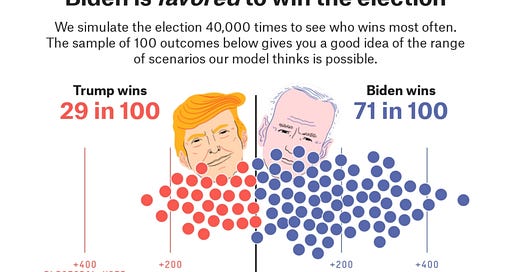Thursday 13 August, 2020
A musical alternative to the morning’s radio news
Leo Kottke plays Bach (Jesu, Joy of Man’s Desiring)
I heard Kottke play this one evening at the Cambridge Folk Festival in (I think) the 1970s. At one point a man in the audience began whistling the counterpoint with perfect pitch. It was a magical moment.
It’s too soon to count Trump out
Despite Biden’s apparently impressive lead in the polls at the moment.
Nate Silver has a cautionary note on his site today.
It includes this diagram

But, but…
If these numbers give you a sense of deja vu, it may be because they’re very similar to our final forecast in 2016 … when Trump also had a 29 percent chance of winning! (And Hillary Clinton had a 71 percent chance.) So if you’re not taking a 29 percent chance as a serious possibility, I’m not sure there’s much we can say at this point, although there’s a Zoom poker game that I’d be happy to invite you to.
One last parallel to 2016 — when some models gave Clinton as high as a 99 percent chance of winning — is that FiveThirtyEight’s forecast tends to be more conservative than others. With that said, one shouldn’t get too carried away with the comparisons to four years ago. In 2016, the reason Trump had a pretty decent chance in our final forecast was mostly just because the polls were fairly close (despite the media narrative to the contrary), close enough that even a modest-sized polling error in the right group of states could be enough to give Trump a victory in the Electoral College.
Personally, I won’t believe that Trump has been defeated until the Marines drag him out of the White House on January 20th.
German Princess tries to make Google forget her drunken rant about killing Muslims
More on the weirdness of the so-called ‘Right to be Forgotten’ — which is actually just a right not to be found in a Google search (in some jurisdictions).
Vox has this interesting story about a female German toff misbehaving after a party in St Andrew’s.
In 2014, German princess Theodora Sayn-Wittgenstein, 27 at the time, attended the University of St Andrews’ charity Oktoberfest, got drunk, assaulted police officers and first responders, and said: “I was doing my nails this morning and wondered how many Muslims I could kill.” Her family, with the help of Google and Europe’s right to be forgotten law, have been trying to make that night disappear.
Twice a year, Google shares data about how governments and corporations make requests to the company in its Transparency Report. One section of the report broadly summarizes content removal requests to “inform discussions about online content regulation.”
For Germany, one entry jumps out, identifying “a lawyer’s removal request from a member of a German noble family,” who was “prosecuted following a drunken night out in Scotland.”
The outcome of the complaint was the removal of 197 links from Google search in Germany following a “preliminary injunction against a third party that the identifying content is illegitimate.”
Needless to say, graphic accounts of the night out are readily available on the Web outside of Germany. here’s the Scottish Daily Record‘s report, for example.

Sadly, reports like this are no longer available in Germany, it seems. What the trollop has managed to secure is only partial invisibility, and I guess it didn’t come cheap, given how much posh lawyers charge for even opening their laptops.
The Odds of Catching Covid on a Flight Are Slim
From Bloomberg:
Arnold Barnett, a professor of management science at the Massachusetts Institute of Technology, has been trying to quantify the odds of catching Covid-19 from flying. He’s factored in a bunch of variables, including the odds of being seated near someone in the infectious stage of the disease, and the odds that the protection of masks (now required on most flights) will fail. He’s accounted for the way air is constantly renewed in airplane cabins, which experts say makes it very unlikely you’ll contract the disease from people who aren’t in your immediate vicinity — your row, or, to a lesser extent, the person across the aisle, the people ahead of you or the people behind you.
What Barnett came up with was that we have about a 1/4300 chance of getting Covid-19 on a full 2-hour flight — that is, about 1 in 4300 passengers will pick up the virus, on average. The odds of getting the virus are about half that, 1/7700, if airlines leave the middle seat empty. He’s posted his results as a not-yet-peer-reviewed preprint.
Nevertheless, I won’t be flying any time soon.



